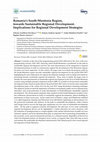Papers by Bogdan Florian Amzuica

Proceedings of the International Conference on Business Excellence
Digitalization and technological advancements have changed how taxes are reported, controlled, an... more Digitalization and technological advancements have changed how taxes are reported, controlled, and audited globally, as well as the speed, quality, and accuracy of the data used in those procedures. The prospects of digitization have been recognized by tax authorities, accountants, policymakers, regulators, and taxpayers, who have begun to reap the advantages of e-services, software, applications, websites, etc. This study explores the impact of business digitization on many facets of tax evasion. The amount of digitalization adoption is gauged using the World Bank's digitalization adoption index, and tax evasion is represented by the shadow economy. The study is based on a vast dataset that contains information from 155 nations. A regression model was employed to assess the relationship between digital adoption and tax evasion. The analysis shows that inflation, unemployment, and economic freedom did not have a significant effect on tax evasion. The findings show a negative and...

Technium Social Sciences Journal, Jul 9, 2023
The underground economy, which includes unlawful activities such as fraud, illegal labour, and cr... more The underground economy, which includes unlawful activities such as fraud, illegal labour, and crime, has received much attention because of its economic and social growth consequences. This article will analyze the underground economy's components, size, causes, and impacts. The study employs comprehensive econometrics, statistical research, quantitative approaches, and real-world data from numerous countries. This study offers insight into the scale of the underground economy and its impact on society by examining descriptive statistics and doing cross-sectional studies. The underground economy is a vast and complex system encompassing various activities, from tax evasion and benefit fraud to counterfeiting and financial scams. It is estimated that the underground economy accounts for up to 30% of global GDP and can significantly impact economic growth, tax revenue, and public safety. The subsequent chapter examines the components of the underground economy, including fraudulent activities, counterfeit goods, and financial scams. It also discusses the challenges of detecting and preventing underground economic activity and the potential consequences of the underground economy for society. The paper calls for a more comprehensive approach to combating the underground economy, including measures to strengthen law enforcement, improve financial regulations, and educate the public about the risks of underground economic activity. This study investigated the relationship between the size of the population and the size of the underground economy in OECD countries. A quantitative research approach was used, and data were collected from secondary sources. The data were analyzed using SPSS software and EXCEL. The results showed a positive, linear relationship between the population and the underground economy. A stratified sampling method to collect data from OECD countries was used, where the data sources included government reports, tax records, academic research, and international databases. The data was analyzed using a simple linear regression model. The study concluded that there is enough evidence at a 95% confidence interval to suggest that the size of a country's population is directly proportional to the size of its underground economy.
Technium Social Sciences Journal, Jan 8, 2023
T e c h n i u m 3 9 / 2 0 2 3 2 0 2 3 A n e w d e c a d e f o r s o c i a l c h a n g e s S o c i... more T e c h n i u m 3 9 / 2 0 2 3 2 0 2 3 A n e w d e c a d e f o r s o c i a l c h a n g e s S o c i a l S c i e n c e s T e c h n i u m.

Proceedings of the ... International Conference on Business Excellence, Jul 1, 2023
The research on the effects of new management and accounting paradigms in the VUCA world on tax e... more The research on the effects of new management and accounting paradigms in the VUCA world on tax evasion has been extensively reviewed in this work. The complexity of tax systems and inequality are the major causes of tax evasion that are the subject of the research. The study's questions center on how the new management and accounting paradigms affect tax evasion and how businesses use to reduce their tax obligations. The primary issues covered in the literature review are how governments have adopted these new tactics and how this new paradigm has resulted in less tax evasion, thanks to the enforcement measures. The government has improved its data analytics capabilities and coordination with the appropriate authorities. The implications of tax evasion and how it has affected governance are major topics of discussion. The main topic of discussion is how this new paradigm has significantly impacted the government's approach to the problem of tax evasion. A thorough analysis of the literature on the effects of new management and accounting paradigms in the VUCA environment on tax evasion is provided in this study as a contribution to the area. It offers insightful information on businesses' tactics to reduce their tax obligations and the effects on the tax system. Also, it offers suggestions for how governments might respond to the problems brought on by the new management and accounting paradigms.

Technium Social Sciences Journal
The study has addressed a major research gap existing in the implementation of block chain techno... more The study has addressed a major research gap existing in the implementation of block chain technologies in public administration. The paper has further focused on the impact of blockchain implementation on the shadow economy, for a sustainable future. Based on the defined research problem, the study objective entailed establishing the effect of blockchain adoption and implementation on the shadow economy, for a sustainable future. Thus, the research question went as follows: the effect the effect of block chain adoption and implementation on the shadow economy, for a sustainable future? The study went for a mixture of primary and secondary data. The study participants and data points entailed stakeholders and players in the cryptocurrency world, drawn from public administration. The data was coded and inputted in SPSS 2. This was followed with reliability test, descriptive statistics and a series of regression analysis. The regression analyses were run to test the hypothesis formula...

Technium Social Sciences Journal
The underground economy, which includes unlawful activities such as fraud, illegal labour, and cr... more The underground economy, which includes unlawful activities such as fraud, illegal labour, and crime, has received much attention because of its economic and social growth consequences. This article will analyze the underground economy's components, size, causes, and impacts. The study employs comprehensive econometrics, statistical research, quantitative approaches, and real-world data from numerous countries. This study offers insight into the scale of the underground economy and its impact on society by examining descriptive statistics and doing cross-sectional studies. The underground economy is a vast and complex system encompassing various activities, from tax evasion and benefit fraud to counterfeiting and financial scams. It is estimated that the underground economy accounts for up to 30% of global GDP and can significantly impact economic growth, tax revenue, and public safety. The subsequent chapter examines the components of the underground economy, including fraudule...

Technium Social Sciences Journal
The research was conducted to explore fiscal morality and underground economy of European countri... more The research was conducted to explore fiscal morality and underground economy of European countries and the US. The study was based on the assumption that the growth rate of an economy has a significant influence on tax compliance. In addition, the research investigated the effect of other factors on tax compliance of various countries. The factors included life expectancy, GDP growth rate, expenditure on education, and proportion of people living below the median income. Tax revenue was used to represent the level of tax compliance. The nations considered for this study included Germany, Italy, France, UK, and the US. Data was obtained from the World Bank Database, for the period 1971-2020. The findings depicted that economic growth was negatively associated with tax revenue. However, life expectancy, education expenditure, and poverty levels had a positive association with tax revenue. The regression models indicated that Italy had the most suitable model for estimation of tax com...

Technium Social Sciences Journal
The research was conducted to explore fiscal morality and underground economy of European countri... more The research was conducted to explore fiscal morality and underground economy of European countries and the US. The study was based on the assumption that the growth rate of an economy has a significant influence on tax compliance. In addition, the research investigated the effect of other factors on tax compliance of various countries. The factors included life expectancy, GDP growth rate, expenditure on education, and proportion of people living below the median income. Tax revenue was used to represent the level of tax compliance. The nations considered for this study included Germany, Italy, France, UK, and the US. Data was obtained from the World Bank Database, for the period 1971-2020. The findings depicted that economic growth was negatively associated with tax revenue. However, life expectancy, education expenditure, and poverty levels had a positive association with tax revenue. The regression models indicated that Italy had the most suitable model for estimation of tax com...

Sustainability, 2020
Currently, at the end of the programming period 2014–2020 and in the view of the new programming ... more Currently, at the end of the programming period 2014–2020 and in the view of the new programming exercise, 2021–2027, knowing where South-Muntenia is positioned on the path to sustainable regional development and how the main determinants can be integrated in regional development policies in order to continuously support the development of the Romanian regions becomes even more important. In this context, the paper aims to evaluate the progress made by the South-Muntenia region towards sustainable regional development for the period 2010–2017 highlighting the main implications for regional development strategies and revealing local initiatives promoting broader sustainable regional development. Thus, more in depth, the paper aims to identify the main determinants of sustainable regional development at the level of South-Muntenia counties using multiple principal component analysis (MPCA), to build an advancement sustainable development index based on panel data for the period 2010–2...
Uploads
Papers by Bogdan Florian Amzuica